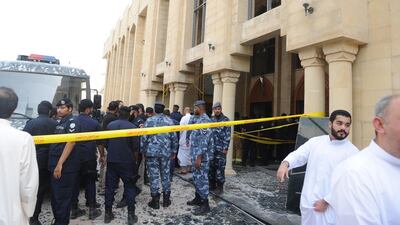The attacks carried out by terrorists over the weekend in Kuwait, Tunisia and France indicate how precarious the present and future of Arabs and Muslims are, wrote Taoufik Bouachrine in an opinion article in the Moroccan daily Akhbar Al Youm.
The world is still in shock. In Kuwait, a suicide attack carried out by a young man killed 27 worshippers in a Shia mosque. In Tunisia, a young man who enjoyed hashish and break-dancing decided to hit the headlines by launching an attack on a beach resort of Sousse that left 38 dead. And in France, a man killed and decapitated his victim, and then took a selfie with the severed head.
The writer wondered how people have become so barbaric and who has loaded the “empty heads” with such explosive ideas.
An Englishman who lost his wife in the Sousse attack only asked one question: Why? This is the question haunting many.
Why do ISIL kill innocents? Why do ISIL – and previously Al Qaeda – choose easy targets and commit such appalling crimes to send messages? Are ISIL members suffering from a mass hysteria? Or have they lost contact with life? These are the questions the writer asked.
ISIL members in Iraq can be divided into three categories.
One, Iraqis who experienced the war, the western embargo, US occupation and, as a result, hunger and displacement in one of the richest Arab country.
Two, remnants of Arab salafists who came from peripheral areas, jails and fragile social and economic structures.
And three, the third generation of Arab and Muslim immigrants in Europe, who chose to join the violent group to avenge their social, economic and mental deprivation, the writer said.
A recent study conducted in the Netherlands found that such problems are the main motive for Muslims in that country to join ISIL, before the group’s propaganda comes to overshadow such failures with a shiny religious cover and transfer recruits from victims into heroes and from disenfranchised into stars.
This is ISIL’s sociological make-up. As for the beliefs, it is the extremist, salafist ideology that grew inside Al Qaeda that reached new heights with ISIL. Unlike Al Qaeda, ISIL has chosen to establish a state on the territories it has controlled, using advanced weaponry seized from the Iraqi army, an extremist ideology and a dose of sectarianism, he wrote.
ISIL is fooling sympathisers into believing that it is the last line of defence for Sunni Islam and for Muslims facing apostates and crusaders. Thus, ISIL hit a Shia mosque in Kuwait to break its national entity and pit Sunnis against Shiites. It killed western citizens in Tunisia to destabilise the only Arab country that is moving on the right track to democracy, as well as push the West into military options so as to divide the world into two warring camps, Bouachrine argued.
Writing in the UAE-based Al Bayan newspaper, Mohammed Fahad Al Harthi said that the current situation in the Arab world paints a tragic scene.
Terrorists are bombing mosques and fuelling sectarian tension, as they grow in size, making Arab countries seem as if they are turning into failed states.
The concepts of national state and citizenship in the Arab region have been fragile. Some post-independence Arab regimes have failed to promote citizenship awareness, creating trumperies around the top of the state’s pyramid while ignoring what is underneath.
He noted that surrounding leaders with an aura was deemed to be the surest way of regime survival, and the media that are complicit with the powers that be have contributed to that. The West, for it part, has been opportunistic in dealing with this reality, turning a blind eye to violations and corruption as long as its interests have been served.
Thus, when the regimes fell in Iraq, Syria, Libya and Yemen, divisions of these countries were inevitable. Amid low levels of education, a weak sense of nationalism, and despair and poverty among the people, terrorist organisations found it easy to gain ground and recruit.
The Gulf countries, particularly Saudi Arabia and Kuwait, have thwarted terrorists’ plans to sow division after all citizens, Sunni and Shia, came together to condemn the attack and comfort each other, according to the writer.
The terrorist attacks should prompt a review of how young people appear to become radicalised. Arab countries must improve education, encourage international scholarships and promote arts and healthy dialogue. These can be a bulwark against any recruitment attempts made by the extremists.
What happened is a tragedy, but it is also a message for all to pay attention to the nature of education and thoughts the youth are exposed to, he concluded.
* Translated by Abdelhafid Ezzouitni
aezzouitni@thenational.ae

